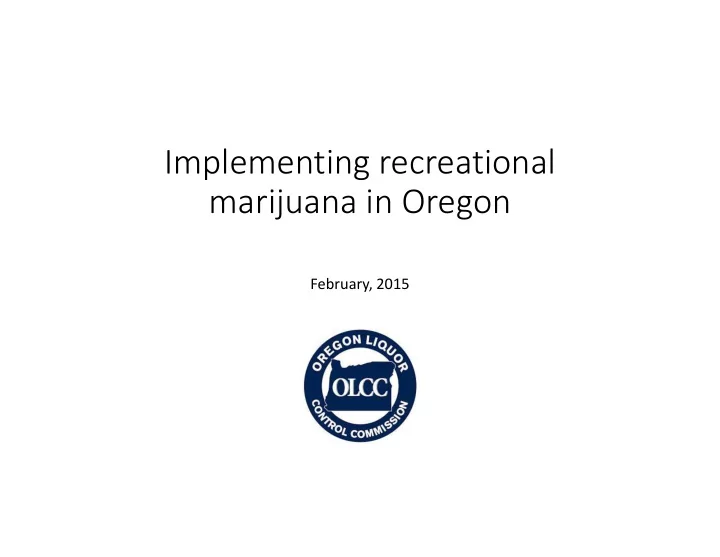

Implementing recreational marijuana in Oregon February, 2015
The Basics • Measure approved by voters in November, 2014. • Gives OLCC authority to tax, license and regulate. • Four license types: • Producer (grower) • Processor • Wholesaler • Retail • Licensees may hold multiple types of licenses
The Basics • Excise tax is paid by the grower • Net Revenue Distribution • 40% to Common School Fund • 20% to Mental Health Alcoholism and Drug Services • 15% to State Police • 10% to Cities For Law Enforcement • 10% to Counties for Law Enforcement • 5% to Oregon Health Authority For Alcohol and Drug Abuse Prevention
The Basics • The act does not affect the Oregon Medical Marijuana Program. • The act allows home grow of up to 4 plants and 8 oz. per residence beginning July 1, 2015. • The act prohibits consumption in public. • The act does not allow local governments to tax marijuana. • Localities may “opt out” through a general election.
Federal Considerations • Marijuana remains illegal under federal law. • On August 29, 2013, the US Department of Justice issued guidance to states that have legalized recreational marijuana
Federal guidance: 1. Preventing the distribution of marijuana to minors; 2. Preventing revenue from the sale of marijuana from going to criminal enterprises, gangs and cartels; 3. Preventing the diversion of marijuana from where it is legal under state law to other states; 4. Preventing state ‐ authorized activity from being used as a cover for illegal activity; 5. Preventing violence and the use of firearms in the cultivation and distribution of marijuana; 6. Preventing drugged driving and other adverse public health consequences associated with marijuana use; 7. Preventing the growing of marijuana on public lands; 8. Preventing marijuana use on public property.
“Seed ‐ to ‐ Sale” Tracking System • Colorado and Washington require robust inventory tracking software in order to ensure that taxes are collected and inventory does not migrate from the legal market. • Designed to allow for more effective audits and satisfy federal guidelines. • Every plant is tracked via code from seedling to final sale to consumer. • Vendors have developed this software.
License Types • Producer: The only license able to cultivate marijuana. Responsible for payment of tax at first point of sale. • Processor: Packages and labels marijuana items. Also manufactures edible marijuana products and marijuana extracts. • Wholesale: Buys and sells at wholesale. • Retail: Sells marijuana items at retail to adults over 21.
Advertising, Packaging and Testing • The act gives OLCC authority to regulate or prohibit advertising. • OLCC can regulate packages and labels to ensure public safety and prevent appeal to minors. • OLCC can adopt standards and testing requirements.
Impaired Driving • The act does not identify a specific limit for marijuana intoxication. • The act requires OLCC to examine research and present a report to the Legislature. • OLCC will partner with DOJ Criminal Investigation Division and Oregon State Police to facilitate research on this issue.
Timeline for Implementation • January ‐ March 2015: Community meetings • February ‐ June, 2015: Legislature in session • July 1, 2015 : Personal possession and home production become legal • March ‐ October, 2015: Rule making • November, 2015: Adopt rules • January 4, 2016 : Begin accepting applications for licenses • Late 2016: Retail sales begin
Public engagement: OLCC • Places to make your voice heard • Listening tour • marijuana.oregon.gov • Rule making hearings • Commission hearings • OLCC can only make rules to implement the law as written • Testing, labeling, some siting requirements, application and licensing
OLCC engagement so far • marijuana.oregon.gov – more than 150,000+ hits since November 5 • E ‐ mail listserve has over 10,000 subscribers • Community meeting planning survey had over 16,000 responses in just one week • Listening sessions in Baker City, Pendleton, Salem, Eugene, Ashland, Klamath Falls, Bend, Newport, Beaverton, Clackamas. • More information at marijuana.oregon.gov
Role of Commissioners • Guide policy • Facilitate public engagement • Support communication • Adopt final rules
marijuana.oregon.gov
Recommend
More recommend